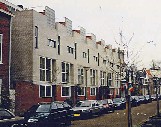Court of Appeal Leeuwarden, 23 August 2000, the State of the Netherlands vs Lodewijk Geveke Bouw B.V.
In 1985 Lodewijk Geveke Bouw B.V., which later changed its name to: Lodewijk Geveke Beheer en Exploitatie B.V., acquired the legal and beneficial title of ownership to a polluted property in the city of Groningen. In or about 1986, 1987 or early 1988, a new corporation was formed with the same name as the former Lodewijk Geveke Bouw B.V. and thus also named Lodewijk Geveke Bouw B.V. This corporation acquired the beneficial title. The premises were demolished, because a housing project was planned on the site. The municipality warned Geveke that a clean up operation had to be carried out first. As was usual at that time the Provincial authority took the initiative and carried out the operation in 1988. The cost, NLG 3,2 mln (over US$ 1.5 mln), was paid by the State and the city of Groningen. It did not prove possible to recover the cost from the polluter. In 1995 the State contended that Lodewijk Geveke Bouw B.V. (new) had been unjustly enriched by the operation and claimed reimbursement of the cost up to the amount of the enrichment (estimated at NLG 320,000), because Geveke had been aware of the pollution at the time of acquisition of the beneficial title to the site. The Groningen District Court considered that Lodewijk Geveke Bouw B.V. (old) was the same corporation as Lodewijk Geveke Bouw B.V. (new), because Geveke itself had not maintained a separate identity. The District Court held that at the time of acquisition in 1985 Geveke ought to have been aware that the pollution could lead to cleanup costs in excess of the value of the property so that it would have a negative value. The fact that Geveke had paid a price which had not taken into consideration the pollution was for risk and account of Geveke. The District Court held that Geveke had been unjustly enriched by the cleanup, but allowed Geveke to prove that it could infer from its contacts with the municipality prior to the purchase that it did not need to take into account a possible claim of unjust enrichment. On appeal Geveke contested the judgment of the District Court.
The Leeuwarden Court of Appeal in its interlocutory judgment of 23 February 2000 held that there were no grounds to identify Geveke (old) as being the same as Geveke (new). It allowed the State to state its view on the reasonableness of its claim against the beneficial owner, Geveke (new), a corporation that did not exist at the time of the purchase in 1985. In its final judgment of 23 August 2000 the Court ruled that it could not be assessed whether the enrichment had devolved on Geveke (old) or Geveke (new), because practically nothing had been raised on the legal relationship between Geveke (old) as legal owner of the site and Geveke (new) as beneficial owner. The Court also ruled that Geveke (new) could not be considered as having acquired (the right to) the property as defined in the Notitie Ongerechtvaardigde verrijking in verband met bodemsanering (Memorandum on Unjustified Enrichment pertaining to Soil Pollution). The claim of the State was rejected.

Some of the houses built by Geveke after the clean up operation by the Government
Supreme Court
On 13 September 2002 the Supreme Court quashed the judgments of the Leeuwarden Court of Appeal and referred the matter to the Arnhem Court of Appeal to decide the matter after a renewed consideration of the case. First, the Supreme Court held that it clearly follows from the wording of section 75, subsection 3 of the Wet bodembescherming (Soil Protection Act) and from its parliamentary history that it extends not only to persons who acquired (legal) ownership of the real property but also to persons with a right to use or with limited rights to such property. The cases to which the provision extends must in any case include a situation where the enrichment benefits a beneficial owner of polluted property. From the pleadings of the State the Court of Appeal had deduced that the State had based its claim on an enrichment of the (legal) owner and that it had renounced its contention that Geveke had been enriched as a beneficial owner. The Supreme Court considered this finding of the Court of Appeal incomprehensible as the only conclusion that could be reached on the basis of the documents in the proceedings was that the State had based the claim on its statement that Geveke had to be regarded as the beneficial owner. The finding of the Court of Appeal that insufficient facts and circumstances had been raised which could support that Geveke had benefited as beneficial owner from the presumed increase of value of the site, the Supreme Court also considered incomprehensible. For, Geveke had not even denied that it was concerned by its having an interest connected with the polluted site.
The judgment was rendered by Justices Van Erp Taalman Kip née Nieuwenkamp, Van der Putt née Lauwers, Aaftink, Hammerstein and Kop.